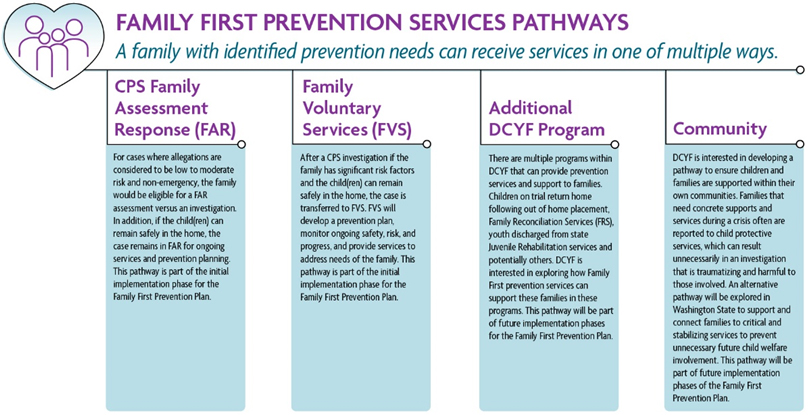Imagine a child welfare system that invests the same amount of resources into families who need support before as it invests after their children are removed. Family First will allocate federal funds to support children and their families with services related to:
- Mental health
- Substance use
- In-home skill-based services
This is the first major modernization and overhaul to federal child welfare law and funding in three decades. Washington is one of the handful of states to do so.
DCYF identifies the initial phase of Family First candidates as children who are at imminent risk of entering foster care but can safely remain at home or in a kinship setting.
Family First candidate groups will phase in over multiple years to increase inclusivity. DYCF understands that all families need support and is committed to extending that support to all populations and communities that would benefit from prevention services.
Family First Candidates
People Being Served By the Following Programs
- CPS Family Assessment Response (FAR)
- CPS Investigation
- CPS Family Voluntary Services (FVS)
- Family Reconciliation Services (FRS)
- State Juvenile Rehabilitation (JR) discharge
Additional Candidates
- Children on trial return home following placement
- Substance Abusing Pregnant Women
- Children experiencing adoption displacement
- Pregnant or parenting Foster Youth
- Pregnant or parenting JR Youth
- Children with developmental disabilities and/or intensive mental health needs
Future Candidates
- Additional families with screened out CPS referrals
- Kinship care families who are not currently involved with DCYF
- Statistical prediction/need for prevention in very high need communities
- Others to be determined
Family First is dedicated to providing services to families that align with the family’s values and are also designed for success. In accordance with the Administration for Children and Families, DCYF chose evidence-based services approved by the Clearinghouse’s well-supported list. The services listed below have undergone an objective and transparent review of the presented evidence.
| Type of Service | Evidence-Based Program | Clearing House Rating |
|---|---|---|
| Mental Health | Family Functional Therapy | Well-Supported |
| Mental Health | Child-Parent Psychotherapy | Promising |
| Mental Health/Substance Abuse | Motivational Interviewing | Well-Supported |
| Mental Health/Substance Abuse | Multi-Systemic Therapy (MST) | Well-Supported |
| Parent Skill-Based | Nurse Family Partnership (NFP) | Well-Supported |
| Parent Skill-Based | Parents as Teachers (PAT) | Well-Supported |
| Parent Skill-Based | Homebuilders | Well-Supported |
| Parent Skill Based | SafeCare | Supported |
DCYF chose this initial set of evidence-based practices (EBPs) in part by the contracts DCYF already has in place for prevention and stakeholder and partner feedback and federal guidance.
During implementation planning, it was discovered that additional integration work was needed to meet the federal data requirements for claiming IV-E funding for services accessed by Home Visiting and Juvenile Rehabilitation services. Integrating these systems is a top priority so that DCYF can claim IV-E funding and increase funding capacity for each of the EBPs in the future.
In the approved plan, DCYF identified multiple pathways by which a family can obtain prevention services in Family First. These include CPS-FAR, FVS, additional DCYF programs, and a future community pathway that will be built with community partners in the coming years. Family First is a massive transformation that will take multiple years to implement in Washington fully.

The chart describes the following Family First Prevention Services Pathways:
CPS Family Assessment Response (FAR)
For cases where allegations are considered to be low to moderate risk and non-emergency, the family would be eligible for a FAR assessment versus an investigation. In addition, the child(ren) can remain safely in the home, and the case remains in FAR for ongoing services and prevention planning. This pathway is part of the initial implementation phase of the Family First Prevention Plan.
Family Voluntary Services (FVS)
After a CPS investigation, if the family has significant risk factors and the child(ren) can remain safely in the home, the case is transferred to FVS. FVS will develop a prevention plan, monitor ongoing safety, risk, and progress, and provide services to address the needs of the family. This pathway is part of the initial implementation phase of the Family First Prevention Plan.
Additional DCYF Program
There are multiple programs within DCYF that can provide prevention services and support to families. Children on trial return home following out-of-home placement, Family Reconciliation Services (FRS), youth discharged from state Juvenile Rehabilitation services, and potentially others. DCYF is interested in exploring how Family First prevention services can support these families in these programs. This pathway will be part of future implementation phases for the Family First Prevention Plan.
Community
DCYF is interested in developing a pathway to ensure children and families are supported within their own communities. Families that need concrete supports and services during a crisis often are reported to child protective services, which can result unnecessarily in an investigation that is traumatizing and harmful to those involved. An alternative pathway will be explored in Washington State to support and connect families to critical and stabilizing services to prevent unnecessary future child welfare involvement. This pathway will be part of future implementation phases of the Family First Prevention Plan.
For more information on the Clearinghouse and what makes a service “evidence-based,” see the FAQ page.
